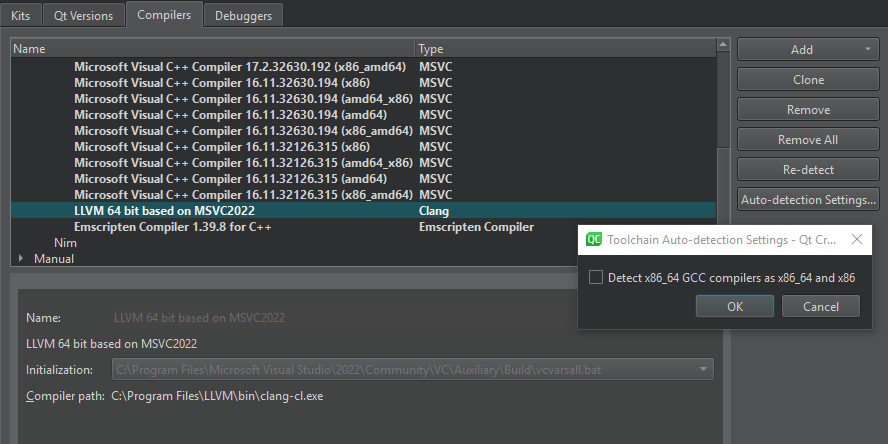For users who can download from Apple a build of Xcode, but not the command line tools. An accepted answer to a comparable question suggests kennethreitz / osx-gcc-installer.In that 'OSX GCC Installer' area, the first of two options is pre-built binaries — for Snow. The download and installation takes quite some time, as Xcode is a little over 2GB as of this writing. Installing the Command Line Tools. As big as Xcode is, you would think that it has everything you need, but you would be wrong. You need one more package from Apple to make your joy complete and to get a working gcc compiler on your Macintosh. Installing G on a Mac. This section is intended to get you quickly started with C programming on your Mac. We'll be installing GCC 4.8.1 and GDB through a tool called Homebrew. If you want an additional guide on all of the following steps (except for installing GCC), the one by Moncef Belyamani is quite helpful. When you follow it, ignore. Gcc for mac free download. MSYS2 MSYS2 is a collection of tools and libraries providing you with an easy-to-use environment for build. Note: This is part of a series of “how-to” blog posts to help new users and developers of BioFVM and PhysiCell.This guide is for OSX users. Windows users should use this guide instead. A Linux guide is expected soon. These instructions should get you up and running with a minimal environment for compiling 64-bit C projects with OpenMP (e.g., BioFVM and PhysiCell) using gcc. This post will guide you how to install GNU GCC compiler on Mac OS X system. How do I install command line tool for xcode package to install Gcc compiler on Mac OS system. How to install gcc command line tool in Mac OS Sierra. Our software library provides a free download of OSX GCC Installer 0.3 for Mac. OSX GCC Installer for Mac is included in Developer Tools. The current installation package available for download occupies 272.7 MB on disk. Our antivirus check shows that this Mac download is virus free.
The latest version of this document is always available athttp://gcc.gnu.org/install/.It refers to the current development sources, instructions forspecific released versions are included with the sources.
This document describes the generic installation procedure for GCC as wellas detailing some target specific installation instructions.
GCC includes several components that previously were separate distributionswith their own installation instructions. This document supersedes allpackage-specific installation instructions.
Before starting the build/install procedure please check thehost/target specific installation notes.We recommend you browse the entire generic installation instructions beforeyou proceed.
Lists of successful builds for released versions of GCC areavailable at http://gcc.gnu.org/buildstat.html.These lists are updated as new information becomes available.
The installation procedure itself is broken into five steps.
- Testing (optional)
Please note that GCC does not support ‘make uninstall’ and probablywon’t do so in the near future as this would open a can of worms. Instead,we suggest that you install GCC into a directory of its own and simplyremove that directory when you do not need that specific version of GCCany longer, and, if shared libraries are installed there as well, nomore binaries exist that use them.
There are also some old installation instructions,which are mostly obsolete but still contain some information which hasnot yet been merged into the main part of this manual.
Copyright © 1988-2020 Free Software Foundation, Inc.

Permission is granted to copy, distribute and/or modify this documentunder the terms of the GNU Free Documentation License, Version 1.3 orany later version published by the Free Software Foundation; with noInvariant Sections, the Front-Cover texts being (a) (see below), andwith the Back-Cover Texts being (b) (see below). A copy of thelicense is included in the section entitled “GNUFree Documentation License”.
(a) The FSF’s Front-Cover Text is:
A GNU Manual
(b) The FSF’s Back-Cover Text is:
You have freedom to copy and modify this GNU Manual, like GNU software. Copies published by the Free Software Foundation raise funds for GNU development.
For questions related to the use of GCC,please consult these web pages and theGCC manuals. If that fails,the gcc-help@gcc.gnu.orgmailing list might help.Comments on these web pages and the development of GCC are welcome on ourdeveloper list at gcc@gcc.gnu.org.All of our listshave public archives.Copyright (C)Free Software Foundation, Inc.Verbatim copying and distribution of this entire article ispermitted in any medium, provided this notice is preserved.

These pages aremaintained by the GCC team.Last modified 2020-03-14.
What is GCC
From wikipedia: The GNU Compiler Collection (GCC) is a compiler system produced by the GNU Project supporting various programming languages. GCC is a key component of the GNU toolchain and the standard compiler for most projects related to GNU and Linux, including the Linux kernel. The Free Software Foundation (FSF) distributes GCC under the GNU General Public License (GNU GPL). GCC has played an important role in the growth of free software, as both a tool and an example.
When it was first released in 1987, GCC 1.0 was named the GNU C Compiler since it only handled the C programming language.[1] It was extended to compile C++ in December of that year. Front ends were later developed for Objective-C, Objective-C++, Fortran, Java, Ada, and Go, among others.[5]
Version 4.5 of the OpenMP specification is now supported in the C and C++ compilers[6] and a 'much improved' implementation of the OpenACC 2.0a specification[7] is also supported. By default, the current version supports gnu++14, a superset of C++14, and gnu11, a superset of C11, with strict standard support also available. It also provides experimental support for C++17 and later.
GCC has been ported to a wide variety of instruction set architectures, and is widely deployed as a tool in the development of both free and proprietary software. GCC is also available for many embedded systems, including ARM-based; AMCC, and Freescale Power ISA-based chips.[8] The compiler can target a wide variety of platforms.
Mac Brew Install Gcc
As well as being the official compiler of the GNU operating system, GCC has been adopted as the standard compiler by many other modern Unix-like computer operating systems, including most Linux distributions. Most BSD family operating systems also switched to GCC, although since then, some BSDs including FreeBSD and OpenBSD have since moved to the Clang compiler.[9] macOS also switched to Clang after using GCC. Versions are also available for Microsoft Windows and other operating systems; GCC can compile code for Android and iOS.
Used in: CS 100, 101
Supported Operating Systems

Available for Windows, Mac, and Linux.
VPN requirement
Connection to campus VPN is not required.
How to Download
Instructions for downloading can be found at https://gcc.gnu.org/install/download.html
Mac Instructions for use
- Open a Terminal window by doing one of the following: Click the Launchpad icon in the Dock, type Terminal in the search field, then click Terminal; or, In the Finder, open the /Applications/Utilities folder, then double-click Terminal.
- Test to see if you have gcc installed. Enter the following command into the terminal window: gcc
- If you get a message saying The gcc command requires the command line developer tools. Would you like to install them now? then click the Install option.
- To check the installation was successful, type gcc in the terminal window and hit return. If you see an error message similar to clang: error: no input files, you are all set. This means the gcc command/compiler exists on your system and you need to enter a C program for compilation.
Windows Instructions for use
- Browse to http://www.cygwin.com and click on the Install Cygwin link near the top of the teal-colored box on the left-hand side of the page, then follow the instructions. Make sure you use the 64-bit version of the setup program if you have a 64-bit computer.
- Answer all the questions using the default answers. You are asked to select a location from which to download. Pick any location; some will be slow and some will be fast. Hopefully, you'll pick a fast location. At some point, you see a Select Packages screen. Click on plus signs next to:
- Devel and click on the Skip column entry next to the gcc-core, gcc-g++, gdb, and make entries. (By default, the installation will skip these packages. By clicking the skip, it becomes unskip, and it will install the packages.)
- Editors and click on the Skip labels next to the emacs, vim, and vim-common entries.
- Net and click on the Skip label next to the openssh and rsync entry.
- Finally, click on the Next button in the lower right corner and continue accepting defaults.
- After installation, open a Cygwin terminal (there should be an icon on your Desktop).
- Type gcc in a Cygwin terminal window. If you see gcc: fatal error: no input files, you are all set. This means the gcc command/compiler installed and you need to enter a C program for compilation.